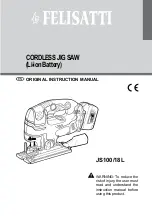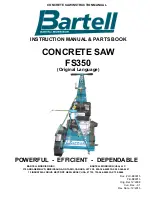
7 – English
OPERATION
MAINTENANCE
Choose a convenient starting point inside the cutting area
and place the tip of the blade over that point.
Rest the front edge of the shoe assembly on the workpiece
and hold it firmly in position during the cut.
Slide the lock-off button to the unlocked position and
depress the switch trigger.
Allow the saw blade to reach full cutting speed.
Tilt the saw until the tip of the blade starts cutting the
workpiece.
Allow the blade to penetrate the workpiece.
Tilt the saw until the shoe is resting on the material and
the blade is perpendicular to the workpiece.
WARNING:
Cutting into electrical wiring can cause the blade, the
blade clamp, and the saw bar assembly to become elec-
trically live. Do not touch metal parts when cutting into a
wall; grasp only the insulated surfaces on the tool. Make
sure hidden electrical wiring, water pipes, and mechanical
hazards are not in the blade path when cutting into a wall.
NOTE: ILLUSTRATIONS START ON
PAGE 8 AFTER
FRENCH AND SPANISH
LANGUAGE SECTIONS.
METAL CUTTING
See Figure 7, page 9.
You may cut metals such as sheet steel, pipe, steel rods,
aluminum, brass, and copper with the saw.
Observe the following tips when metal cutting:
Be careful not to twist or bend the saw blade.
Do not
force the tool and use a slow speed.
Use cutting oil when cutting soft metals and steel. Cutting
oil also keeps the blades cool, increases cutting action,
and prolongs blade life.
Never
use gasoline since normal sparking of motor could
ignite fumes.
Clamp the workpiece firmly and cut close to the clamping
point to eliminate any vibration of the work. When cutting
conduit pipe or angle iron, clamp the workpiece in a vise
if possible and cut close to the vise. To cut thin sheet
material, “sandwich” the material between hardboard or
plywood and clamp the layers to eliminate vibration and
material tearing.
Always keep firm pressure on the shoe assembly to hold
it securely against the workpiece.
WARNING:
When servicing use only identical replacement parts. Use
of any other parts can create a hazard or cause product
damage.
WARNING:
Always wear eye protection with side shields marked to
comply with ANSI Z87.1. Failure to do so could result in
objects being thrown into your eyes resulting in possible
serious injury.
WARNING:
To avoid serious personal injury, always remove the bat-
tery pack from the tool when cleaning or performing any
maintenance.
GENERAL MAINTENANCE
Avoid using solvents when cleaning plastic parts. Most
plastics are susceptible to damage from various types of
commercial solvents and may be damaged by their use. Use
clean cloths to remove dirt, dust, oil, grease, etc.
WARNING:
Do not at any time let brake fluids, gasoline, petroleum-
based products, penetrating oils, etc., come in contact
with plastic parts. Chemicals can damage, weaken or
destroy plastic which can result in serious personal injury.
Summary of Contents for P518
Page 22: ...NOTES NOTAS...
Page 23: ...NOTES NOTAS...








































